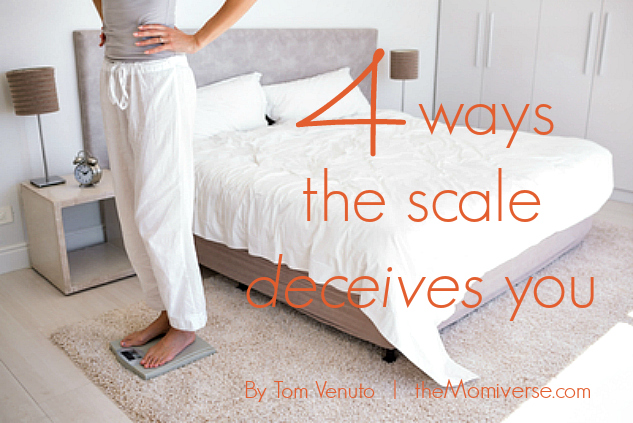Many people are driven stark-raving mad by lack of weight loss or by wild fluctuations in their daily or weekly weigh-ins.
But what do you do about it? Many people think the answer is throwing away the scale. I sympathize with the frustration, but don’t ditch your
scale just yet. There’s something you should do instead.
Focus on body composition.
Your ratio of fat to muscle is known as body composition and it’s one of the ideal ways to judge your progress. Instead of obsessing over the reading on your scale, shift your focus to body composition.
The scale is not your enemy. It can be your friend if you know how to use the results as feedback data, not an emotional trigger. Obsessing over what the scale says without considering body composition is where the trouble begins, because body weight alone can deceive you.
Here are four ways the scale deceives you:
1. Weight and fat are not the same.
The only thing your scale can do is measure your total body weight. That includes everything: fat, muscle, bone, organs, blood, water, gut contents and muscle glycogen. Your scale doesn’t tell you how much of that weight is fat and how much is muscle.
Most scale-focused dieters assume that weight loss is good and weight gain is bad. But what if the weight gain is 100% pure muscle?
What if half the weight you lost was muscle (that can happen if you don’t use strategies to build and feed muscle while you’re losing weight). Muscle is the weight you want to keep. Fat is the weight you want to shed.
2. Water weight can shift.
Your body weight can fluctuate two to four pounds each day from shifts in water alone. That shift could be even greater over the course of the first week on a diet, especially a reduced-carb diet. The heavier you are to start, the bigger the first week’s weight loss (including water) is likely to be.
Losing water weight is easy. When I was in college, I had wrestler friends who would drop up to 15 pounds overnight to make a weight class, using natural diuretics, saunas, sweat suits and other dehydration tricks.
If you’re not a weight class athlete, what good is it to lose water weight only to gain it back as quickly as you lost it? That’s how diets fool you.
3. Carbs (glycogen) is part of your body composition.
Carbohydrates are stored in the muscle as glycogen and water is stored along with them. That’s why your weight can notch up a few pounds when you eat more carbs. Add sodium and you may gain even more.
For those wanting fat loss, the sudden increase on the scale without knowing about body composition could be cause for freaking out. For those wanting muscle gain, the increase on the scale without knowing about body composition could be cause for celebration.
But both the panic and the celebration were premature. The scale deceived you again – in both directions. The burner didn’t gain fat weight and the builder didn’t gain muscle weight – it was just glycogen and the water that is stored with it.
4. Know what’s in your gut.
Everything in your gastrointestinal tract has weight, so if you’ve eaten some “heavy” meals recently, you’ll weigh more than if you haven’t been eating much.
If you don’t eat anything for a day, you could lose a lot of weight, literally overnight. But rest assured, the weight you lose is not just body fat. You can’t lose that much fat in only one day.
This also explains weight loss seen with colon cleansing. Why people feel the urge to cleanse their colons (unless their gastroenterologist told them to), I’ll never understand. Yet this is one of the oldest weight loss scams in the book. The weight lost is not fat.
Focus on body composition and your scale can be a valuable tool in your health goals.
This Week's Articles Read, learn, live
-
 Summertime grilled vegetables
Summertime grilled vegetables
-
 5 Ways to make this summer full of unforgettable family fun
5 Ways to make this summer full of unforgettable family fun
-
 10 Reasons to take a family vacation in Puerto Vallarta
10 Reasons to take a family vacation in Puerto Vallarta
-
 5 Fun tips for spring cleaning with kids
5 Fun tips for spring cleaning with kids
-
 10 chick flicks with New Year’s Eve scenes
10 chick flicks with New Year’s Eve scenes
-
 The day after Christmas: 5 ways to handle the biggest downer of the year
The day after Christmas: 5 ways to handle the biggest downer of the year
